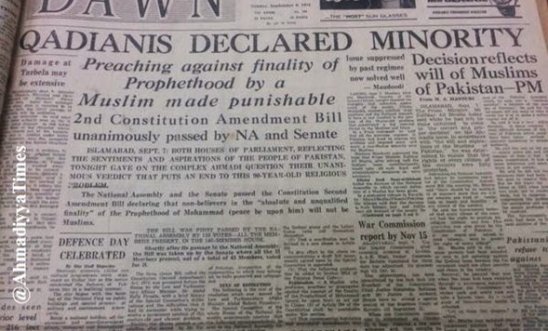
Forgotten Constitution and Founder

Written by Irfan Ali, Country Coordinator for Pakistan
In Pakistan, where minorities often lack basic rights, even the majority is increasingly deprived of freedoms such as speech, religion, and political participation. Certain minority groups, particularly on religious grounds, face structural and state-sponsored persecution. One of the most extreme examples is the Ahmadiyya community.
The Ahmadiyya religious movement, which originated in India in 1836, is a sect that in many ways conforms to Islamic practice. However, orthodox Muslims reject the community due to the belief that its founder, Mirza Ghulam Ahmad, claimed prophethood challenging the central Islamic doctrine of Khatm-e-Nabuwat. This has led to decades of public and state-promoted persecution of Ahmadis in Pakistan.
Evidence of this is stark. Attacks on Ahmadiyya mosques and killings of community members, often by fundamentalist Islamist groups such as Tehreek-e-Labbaik Pakistan (TLP), are growing. According to Amnesty International’s June 2024 report, on 17 June a mob of around 150 people attacked an Ahmadiyya place of worship in Kotli, Pakistan-administered Jammu and Kashmir. The attackers opened fire, then destroyed the minarets and arch of the building. In another incident reported by Amnesty International in 2025, a man was lynched by a mob after Friday prayers outside an Ahmadiyya worship site in Karachi. Later in May, a cold storage unit was destroyed when it was discovered that the body of an Ahmadi woman was being kept there. These are not isolated events. Reports suggest that hundreds of Ahmadi community members have been killed, and many live without basic state protection.
Even more troubling, Amnesty International has documented how local authorities forced Ahmadi community members to sign affidavits agreeing not to celebrate Eid. This persecution is not only tolerated but actively enforced by the state.
In 1974, Pakistan’s Second Constitutional Amendment officially declared Ahmadis as “non-Muslims”. This amendment bulldozed the religious freedoms enshrined in the original 1973 Constitution. Article 20, Freedom to profess religion and to manage religious institutions.” (a)every citizen shall have the right to profess, practice and propagate his religion; and (B) every religious denomination and every sect thereof shall have the right to establish, maintain and manage its religious institutions. Furthermore, Article 25 guarantees equality of all citizens. Pakistan is also a signatory to the United Nations Charter, which upholds freedom of religion. But in practice, these guarantees do not apply to the Ahmadiyya community. By law and in public discourse, the state denies this community its rights despite its historical role in supporting Pakistan’s identity and national fabric.
Members of this community are forced to hide their religious identity not only because of societal threats but also due to state pressure empowered by hardline religious clerics. Everyday life becomes a struggle. Ahmadis must hide their beliefs to go to school, get jobs, or even get identity documents. Textbooks either ignore or insult them. And yet, this same community has done so much for Pakistan in education, economy, and patriotism This was not the case at the time of Pakistan’s independence. My reason for naming this blog “Forgotten Constitution and Founder” is simple. The Constitution has been clearly violated. And so has the vision of Pakistan’s founder, Muhammad Ali Jinnah. In his famous speech, Jinnah declared:
“You are free; you are free to go to your temples. You are free to go to your mosques or to any other places of worship in this State of Pakistan. You may belong to any religion or caste or creed – that has nothing to do with the business of the state.”
This vision has been abandoned. What I may call a betrayal of the founding promise is now a routine part of state behaviour. A country that ignores its founding leader’s words, rewrites its constitution to limit rights, and targets loyal citizens has forgotten its own purpose.
Our blogs are written by Amnesty International staff, volunteers and other interested individuals, to encourage debate around human rights issues. They do not necessarily represent the views of Amnesty International.
0 comments